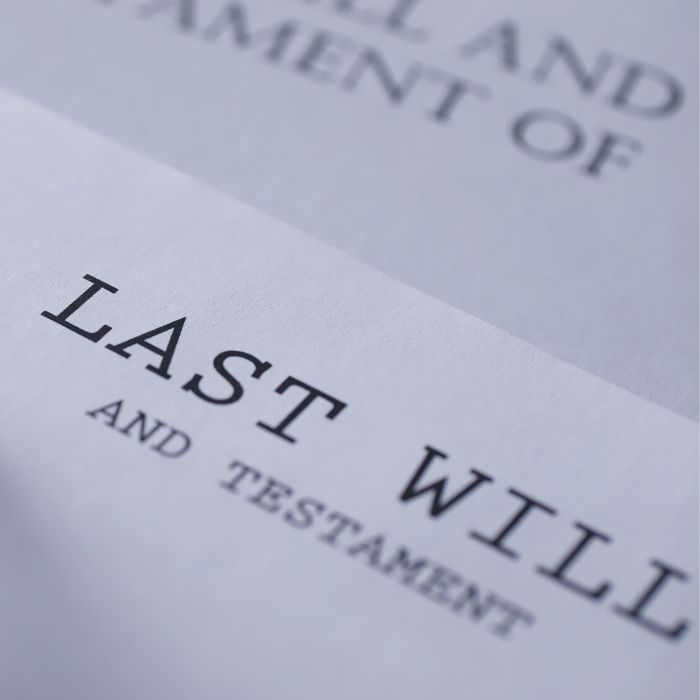I’m the Executor of a Will — What Do I Need To Do?
Guiding You Expertly Through the Role of Executor
Executor of a Will NSW
You’ve been named as the Executor of a Will.
You may have been aware that the responsibility would fall upon you — or, it may have been a complete surprise. Either way, it’s only natural that you feel somewhat apprehensive, anxious, and perhaps overwhelmed.
The role carries serious responsibility and accountability — it’s crucial that you carry out the duties diligently and conscientiously.
Yet, it’s a position that also should instil you with comfort, pride, and consolation — knowing that the recently deceased named and trusted you personally to carry out their precious final wishes.
At Falzon Legal, we will reassuringly and patiently guide you through your role as Executor. Not just advising on the correct procedure of the more mundane tasks, but also acting for you if an application for Probate is required.
I’m the Executor of a Will — What Now?
Being an Executor is a unique position.
In most circumstances, it’s a responsibility of which you have no experience or training, little background knowledge, and may never have to carry out again.
Yet, it’s a role that you’re expected to carry out thoroughly, conscientiously, and in a timely manner.
Furthermore, if you’re not a close friend or family member of the deceased — the realisation of this position may be a complete shock. Even if you were aware of being named as Executor, you’re expected to fulfil your obligations diligently — while also dealing with the emotional heartbreak of losing a loved one.
But, it’s surprising how rapidly you can rise to the challenge.
Executing the intentions of the deceased can provide solace and comfort. Knowing that you, above all others, were chosen for this crucial role — and that, as the recently passed on looks down upon you, they can see their wishes being lovingly and carefully fulfilled.

While every situation is different, typically the role involves the following:
- Locating a copy of the Will.
- Providing a copy of this Will to a solicitor.
- Applying for Probate.
- Arranging the funeral.
- Confirming the assets and liabilities.
- Protecting the assets.
- Realising the assets.
- Addressing liabilities.
- Completing a tax return where required.
- Administering and dividing the estate.
- Providing full accounting information.
At Falzon Legal, we will patiently navigate you through all the above obligations and undertakings — completing legal documentation where necessary, and being as hands-on as you prefer.
What Is Expected of Executor of a Will NSW?
Your role as Executor is to fulfil the wishes and directions outlined in the Last Will and Testament — administering and dividing the estate after the Testator (the person who made the Will) passes on.
During this time, it’s important that you:
- Remain independent, especially if there are disputes or conflicts.
- Always act responsibly, reliably, and in the best interests of the deceased.
- Comprehend the taxation and financial obligations.
- Ideally reside in NSW — being easier to obtain Probate.
- Don’t use any assets for your own benefit — unless provided for in the Will.
You also may have to apply to the Supreme Court of NSW for Probate.
Unsure What Is Expected of You as Executor? Chat With Us Now
What Does an Executor of a Will Do?
Generally speaking, the responsibilities and duties of you, as Executor, include:
Organising Probate
This process fulfils two functions — confirming the validity of the Will, and granting you, as Executor, the authority to address the deceased’s affairs.
Typically, Probate is required where the Executor needs access to the deceased’s privileged and personal information or investments to fulfil their duties — such as allocating and dividing funds from a bank account.
Unless there are exceptional or unusual circumstances — including a challenge or contest — the estate can be administered and apportioned six months after the date of passing.
As obtaining Probate can be a complex legal area, we recommend that you chat with us — guiding and assisting you compassionately and professionally through this area.
Organising the Recently Deceased’s Funeral
In many circumstances, direct members of the Testator’s family will arrange the funeral — which may or not include you if you’re related to the deceased.
Should the family take on this role — which is only natural for them to want to do so — you still have responsibilities.
It’s important that you consult the Will, to see if the deceased indicated any funeral directions — for example, a particular religious ceremony, or if they want to be buried or cremated.
If the Testator passed on leaving no family behind, or the family is unwilling to arrange the funeral — it’s your responsibility.

Confirm the Liabilities and Assets
You need to ascertain what the deceased owned and also what they owed. You will need to contact — usually in writing:
- Banks, investment providers, and financial institutions.
- Private and public companies.
- Service providers — for example, telephones and utility businesses.
- Land registry for property.
Furthermore, it’s wise to collate an inventory of physical goods — such as household items and vehicles. Once the assets have been assessed, it’s your responsibility to ensure that they’re sufficiently protected from depreciation or loss — for example, safely securing valuable items of jewellery.
Calling In the Estate
In order for you to take control of the deceased’s effects, you must transfer the assets into your name — known as calling in the estate. Usually, you require at least a copy of the death certificate and the Grant of Probate.
Furthermore, remember that assets are not necessarily cash in the bank or physical items.
If the deceased died being owed money, it’s your duty to collect these debts. That is, of course, unless the terms of an agreement nullify the liability in the event of death.
Meet Outstanding Liabilities
As Executor, you must satisfy existing debts with funds from the deceased’s estate. Bear in mind, these cannot be from assets that are left to a beneficiary.
Not only does this include meeting outstanding bills from companies, utilities, and individuals — but also to the tax office.
This process demands careful consideration and precision. A mistake, error, or omission could mean that, at a later date, you are left liable for unsatisfied liabilities. We suggest that you allow us to assist and guide you on this matter to safeguard against future issues.
Distribute the Assets in Accordance With the Deceased’s Wishes
Caution is the keyword here.
While it may initially appear as the most straightforward aspect of being an Executor — that is, simply following the deceased’s wishes for the allocation of their estate — it requires precision.
Don’t assume you know what the Will-maker meant in ambiguous areas, make value judgements, or distribute cash or goods based on what you consider fair.
Giving beneficiaries more than they are entitled, less than they are due, including people not mentioned in the Will, or indeed omitting entitled persons — all actions that can lead to you being personally liable for mistakes.
At Falzon Legal, we can ensure that the deceased’s wishes are carried out within the law and in full accordance with their stated intentions. Working alongside you as advisor, we will counsel you expertly and accurately in the asset distribution.
Detailed Accounting For Your Administration
All beneficiaries and legally relevant statutory bodies are entitled to receive — and have explained and justified to them — accounting documentation of your Executor actions.
It’s therefore crucial that at every stage of the Execution process, you create and retain precise financial records. Not just providing clarity and transparency, but also preventing future investigations, audits, or challenges.
Should a beneficiary consider your actions incorrect, unreliable, or questionable — they are permitted to approach the Court to have you removed from the Executor position.
Contact Falzon Legal Today and Let Us Put Your Mind at Rest About Being Executor of a Will
I’m Part of Joint Executors of Will NSW — What Does This Mean?
It’s not unusual for a person to name more than one Executor in their Last Will and Testament. For many Testators, it’s a safeguard — protecting against one of the Executors being reluctant or unable to take on the role. If you’re stated as one of numerous Executors — and you and the other parties are happy to take on the position — you may work together to fulfil the required duties. This can permit relieving the burden off one single person, and also deliver welcome checks and balances.
In some circumstances, it’s wise to consider a solicitor-executor for taking on the more legal and detailed tasks — enabling the laypersons to address more personal areas, such as the belongings or pets of the deceased.

I Don’t Want To Be an Executor — What Should I Do?
We understand that the responsibility of Executor — while an undoubted honour — isn’t for everyone. It is not a legal obligation.
There might be numerous, and completely understandable reasons, why you consider the position unsuitable for you. This can include:
- Living abroad or even in a different state to NSW.
- Worries about taking on such a crucial role and responsibility.
- Poor health — both physical and cognitive.
- Wanting to avoid litigation if the Will is to be challenged or contested.
- Simply not having the time.
If you do not wish to take on this role, and there are no other named joint Executors, you may decline the position. Before commencing the Probate application, you should commit to a renunciation or appoint the NSW Trustee and Guardian to take on the duties.
However, if you’ve already started acting as Executor — and then change your mind — it can be complicated and awkward to renounce your position.
Talk to us first. At Falzon Legal, we will guide you through the role of Executor, the time commitment, and what it means for you. This compassionate counsel can ensure that you’re totally dedicated to the position before commencing action.
What Is the Time Limit for Executor To Distribute Estate NSW?

As Executor, you should not divide and allocate the assets and estate for at least six months — allowing sufficient time for any unforeseen claims to be made.
While most matters can be completed within 12 months, it’s not unusual for more complicated affairs to take up to two years.
It’s your responsibility to distribute the estate in a timely manner. If there are any delays, and third parties can show that they were avoidable and resulted in loss or harm, you may be found liable.
Being assisted by a specialist Wills and Estate Lawyer can ensure that your duties are carried out in a reasonable time — and you avoid the concerning prospect of litigation.
Do I Get Paid To Be an Executor of a Will?
It’s expected that in taking on the position of Executor, you’re going to encounter additional and unexpected costs — for example, mileage and fuel expenses for your transport travelling from bank to bank.
Thankfully, you’re entitled to remuneration.
You can apply, with our assistance if required, to the NSW Supreme Court for compensation — addressing the costs and time of your Executor duties.
A professional Executor — such as a solicitor — doesn’t receive compensation, but instead is remunerated with a fee. Some Testators provide for this cost in their Will. Alternatively, the beneficiaries may elect to reimburse the specialist for their work.
In NSW, under the auspices of the Probate and Administration Act (1898) — the Executor may make an application for a payment from the Testator’s estate. In these circumstances, the Court will determine a fair and sensible rate depending on the work involved — which is typically around one-to-two percent of the value of the estate.
Falzon Legal — Your Trusted Advisor While You Act as Executor
Being an Executor is an honour — but the role carries serious responsibility, can be complex, and is time-consuming.
But, you don’t have to face the challenge alone.
At Falzon Legal, we will considerately guide you through the entire process — from gathering asset information and applying for Probate, through to dividing the estate and providing detailed accounting.
Even if you decide the role is not for you, and while flattered by Testator’s faith in your ability, believe that you cannot fulfil the duties adequately — we can help by renouncing your position.

Always available for an amiable and compassionate discussion at our offices in Parramatta or your home — we will counsel, advise, and assist, in any way you deem suitable.
Allow us to ease the burden during an often worrying, complicated, and emotionally tough time — chat with us today about being the Executor of a Will.
More Executor of Will FAQs
What If the Executor Fails To Act?
If a designated Executor fails in their duties, any beneficiary may lodge a complaint with the NSW Supreme Court. Should you believe that you cannot fulfil the role of Executor, speak to us as soon as possible to discuss renouncing your role.
Can an Executor of a Will Be a Beneficiary in Australia?
Yes. There are no impediments to the Executor also being stated in the Will as a beneficiary.
What Is the Punishment for Executor Misconduct Australia?
If the Executor doesn’t conduct themselves appropriately, makes mistakes, or fails in their duties — they may have Probate revoked and face personal liability for financial loss.
What Is the Punishment for an Executor Acting Fraudulently?
In addition to having Probate revoked and being liable for financial losses — an Executor who is alleged to have acted fraudulently may also face criminal charges.
What Does an Executor of a Will Do in NSW If They’re Confused by the Position?
If you’re unsure of the duties, responsibilities, and requirements of being an Executor — we strongly recommend speaking to a legal professional.
At Falzon Legal, our specialist team of Wills and Estate Lawyers are more than happy to guide and assist you through this position — speak to us today.
Can a Sole Beneficiary Be an Executor of a Will?
Yes. There are no barriers to a sole beneficiary also taking on the role of Executor. Typically this occurs when the deceased’s spouse inherits the estate.
What Does an Executor of a Will Do in Australia About Challenges to the Will?
Should you be the Executor of a Will, and during the fulfilment of your duties you receive notification that the document is being challenged — stop and contact Falzon Legal immediately.
Contests and challenges to a will require specialist attention. If you begin to allocate and divide the estate during such action — you may be found liable for financial losses.

